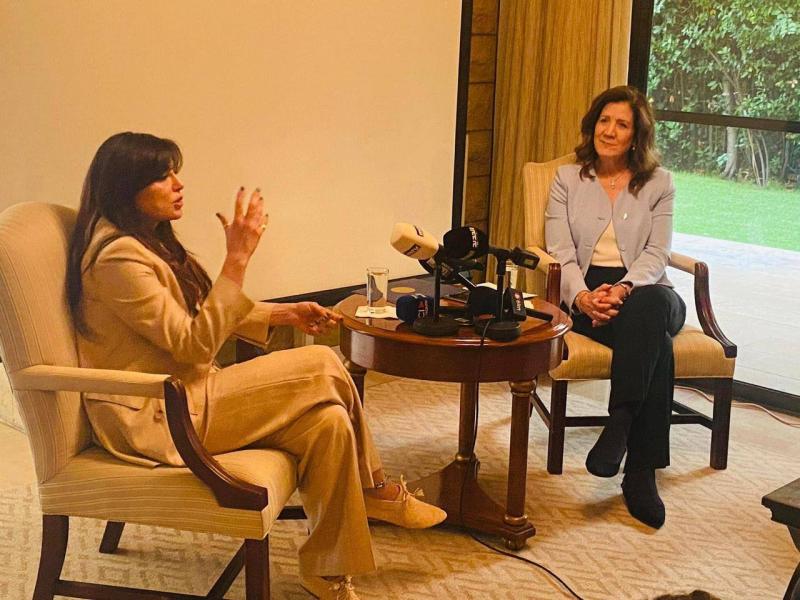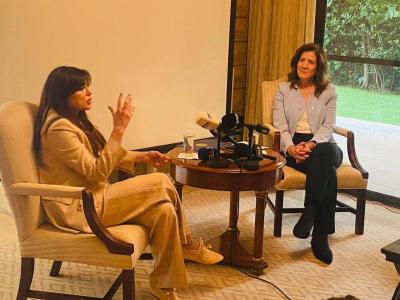Award-winning, known for her high standards in filmmaking that highlight complex realities of Lebanese society, a globally recognized director, nominated for an Oscar for Best Foreign Film, and an activist actress, Nadine Labaki is a prominent figure. In an effort to spotlight this creative talent, the American embassy in Beirut hosted a meeting between Lebanese director Nadine Labaki and a number of emerging filmmakers and film students, in the presence of the American ambassador to Lebanon, Dorothy Shea, as part of the "Meet the Artist" program organized by the cultural section in its tenth edition. The evening served as a window into Labaki's extensive experience in film directing.
Ambassador Shea noted in an interview with "Wardna" that the "Meet the Artist" series held at the embassy is "one of my favorite initiatives, where we invite a successful artist to share their experiences with the new generation." She stated, "We are very proud to have Nadine Labaki with us today. We have a full space for future live-action film producers, and she will share her knowledge with them." She added, "We are delighted to be among the organizers here at the embassy, and this is our way of supporting artists."
As her tenure in Lebanon nears its end, the American ambassador addressed the Lebanese youth through "Wardna," saying, "We believe in you, and we have many initiatives at the embassy to prove that. We wish you all the best. I will not leave just yet, as I will stay with you for a while until the Senate decides on the matter."
Clips from Labaki's films were screened, during which she indicated that "filmmaking allowed me to escape from the reality of war in Lebanon and transcend my narrow limits." She stated, "When I realized that to create these different realities from my own facts, I had to be a filmmaker, in order to fulfill my desire to create stories for others." Labaki expressed her belief in the power of cinema and how it can change people's lives.
In an interview with "Wardna," Labaki highlighted that there are Lebanese films that depict certain realities with great honesty and realism, while also pointing out weaknesses in other cinematic works, particularly regarding the failure to reflect the true image of society. Labaki added, "The difficulty today is not in making a film, but in the time we live in and the phase Lebanon is going through, and how to address reality responsibly. The issue, therefore, is the magnitude of responsibility, not the success of the film."
She continued, "It is very important for me to reflect on issues and shed light on them through the lens. These are issues that need to be addressed and discussed, for there are many things in our world that need to change. There are feelings of anger and deprivation towards injustice and inequity; the world does not function as it should."
In response to Ambassador Shea's question about the components that led her to the keys of success in her work, Labaki replied, "There is no specific recipe to follow, but what is important is the 'why.' Why do I do what I do? Why do I want to raise certain topics? Why do I want to make a film about them or write about them? What drives me, and what do I truly want to convey in the small details of a film or a specific scene? Why do I focus on that? Where do things begin and where do they end? Why should this scene exist? Each time I write or direct, I ask myself if I am true to my fundamental anger, deprivation, or rejection of a certain reality. Unfortunately, that often begins with a negative feeling, but I always try to change that to something positive; we all have a reason for our existence and how we live as humans in line with that and with the essence of our being."
Students then posed their questions to Labaki, where she elaborated in her responses on the challenges she faced while executing her films, emphasizing that she "transmitted facts she witnessed with her own eyes and conducted research about in books and other sources," pointing out that "reality can sometimes be much harsher than the scene, but that does not negate its potential impact on viewers, especially when dealing with true stories. We are made to interact with others, to feel their pain, and to handle that pain as if it were personal to us."
The evening marked the tenth episode of the "Meet the Artist" series, noting that the program had previously hosted celebrities such as George Khbeiz, Raouf Rafii, Nadim Sharafian from the "Mayyas" troupe, and international designer Elie Saab.




